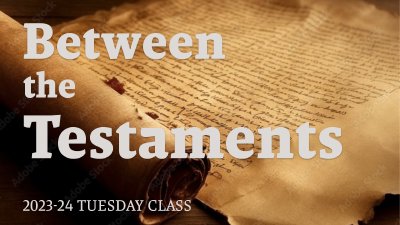


Between The Testaments
2023-24 Tuesday Class


Lesson 15 - Judea Under the Romans
April 2, 2024 • Matthew Allen


Lesson 14 - Last Years Before the Romans
March 26, 2024 • Matthew Allen
The years before the Romans were filled with intrigue and difficulty. How did the Jews handle it?


Lesson 13 - The Hasmonean Revival
March 12, 2024 • Matthew Allen


Lesson 12 - The Maccabean Revolt 2
February 27, 2024 • Matthew Allen
In 167 BC, amidst the turmoil caused by the enforcement of Antiochus IV's decrees against Jewish customs, Mattathias, an elderly priest, and his sons fled Jerusalem for their family estate in the town of Modiin.


Lesson 11 - The Maccabean Revolt 1
February 20, 2024 • Matthew Allen
This period raised critical debates about the role of the Torah in Jewish life. Hellenizing Jews viewed it more as a historical document of sentimental value, akin to Greek epics, while conservatives saw it as a strict guide for living. Moderate views sought a balance, treating the Torah as a compass rather than a straightjacket. However, Jason's Hellenizing measures and the registration of Jerusalem's inhabitants as citizens of Antioch further divided the society, polarizing it between liberals and conservatives.


Lesson 10 - Seleucid Rule II
January 30, 2024
Finally, under Seleucid rule, the Jews enjoyed a few positive years and the significant growth of Jerusalem as a cultural and economic hub for several years. This would last until around 188 BC when significant political and economic downturns would cripple the Seleucid empire. Off to the west, Rome was becoming increasingly a world power, having gained control of the Italian peninsula, most of Spain, northern Africa, and other areas across the western Mediterranean. Rome was advancing their interests east and viewed the Seleucids as a threat.


Lesson 9 - Seleucid Rule I
January 23, 2024
With a new century dawning, change was on the way. The Ptolemaic empire was in trouble, with domestic threats across Egypt and growing tensions with Antiochus and Seleucia. Sosibius and Agathocles, the regents who were in charge after Ptolemy IV’s sudden death, were publicly lynched by the army in an attempted coup in 202 BC. Antiochus seized this moment and began to advance to the south toward Egypt. The fifth Syrian War had started.


Lesson 8 - A Century of War
January 16, 2024 • Matthew Allen
After the death of Seleucus I in 281 BC, his son Antiochus I took over. Early on, he focused on securing peace in the heart of the Seleucid empire, which left Asia Minor open for exploitation. Over a few decades, the Gauls, who had invaded Greece, began an eastward push and took over much of western Asia Minor. Thus, that region became known as Galatia. Unfortunately, the rivalry between the Seleucids and Ptolemies did not lessen. In fact, over the next century, there would be six wars between them.


Lesson 7 - The Grecian Empire After Alexander
January 9, 2024 • Matthew Allen
Problems and consequences from this spread throughout the empire and led to decades of constant war, political turmoil, and the draining of resources, not to mention the number of deaths — leaders, soldiers, and common people. This went on for over two decades after Alexander’s death.


Week 6 - The Rise of Alexander the Great
December 19, 2023 • Matthew Allen
Alexander's rise to power marked the beginning of an extraordinary era in which he would expand the Macedonian Empire to unprecedented extents, a testament to his military genius and the groundwork laid during his formative years.


Week 5 - The Jews Under Persia (2)
December 12, 2023 • Matthew Allen
Information regarding Israel between Nehemiah and the end of the Persian empire is scarce. This has led to its being characterized as a blank or ‘dark age’ in the history of the Jews.


Week 4 - The Jews Under Persia (1)
December 5, 2023 • Matthew Allen • 2 Kings 17
After Cyrus’ decree allowing the Jews to return to their homeland, the first wave of those returned set out after a time of planning and raising the funds necessary. Rebuilding and starting an entire community from scratch was a formidable task. Once the Jews arrived in their homeland, they faced significant challenges. How were they to deal with finding the necessary resources for providing for their community and how were they to navigate the suspicion and hostility from those who already lived in the land? Only by the help of God did they succeed and under the leadership of Zerubbabel, they resettled Jerusalem and prepared to build the temple.


Week 3 - The Persian Period
November 28, 2023 • Matthew Allen • Isaiah 45:1–3, Ezra 1:1–4
The Persian Empire—a realm that stretched from the Indus Valley to the fringes of the Aegean Sea profoundly and forever influenced the course of Jewish history. The empire was established by Cyrus the Great. His rise to power not only involved conquest and empire-building; it also brought sweeping cultural change and enlightened leadership that reshaped the ancient world. His policies and decrees set in motion events that would fulfill biblical prophecies and alter the destiny of the Jewish people, leading to their return from exile and the rebuilding of the Temple in Jerusalem. During this time, the Old Testament books of Ezra, Nehemiah, Esther, Haggai, Zechariah, and Malachi uncover the challenges and triumphs of the Jewish people as they navigated life under Persian rule. We'll see how their faith was tested and strengthened, how their identity was preserved amidst diversity, and how their experiences during this period laid the groundwork for future generations.


Week 2 - The Babylonian Period
November 21, 2023 • Matthew Allen
In this lesson we will cover a crucial period in the history of the nation of Judah—the Babylonian Period. This period was marked by the Babylonian exile and the eventual restoration of the Jewish people. We will explore the historical context, key events, and spiritual lessons from this significant era in biblical history.


Week 1 - Introduction to the Intertestamental Period
November 7, 2023 • Matthew Allen
The intertestamental period, often referred to as "the four hundred silent years," was far from silent in its impact on the development of biblical history and the world in which Jesus and the early Christian community emerged.
